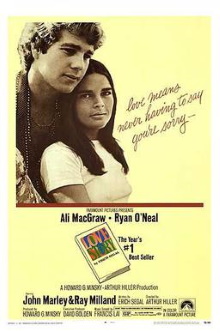
Apparently this is one of the most iconic romantic films of all films, enough so that my wife was surprised that I haven’t watched it. I have to admit that I certainly recognize the theme song even if I never knew that it came from here. The film itself however is pure sentimental pap that could only have ever worked in that era as it makes absolutely zero effort towards realism or authenticity. Even the film’s famous catchphrase is too shallow as critics of the era recognized.
Upon the death of his wife Jenny Cavilleri at the age of 25, Oliver Barrett IV reminiscences about their romance. They meet as university students in a library, though he as the heir of a rich and prestigious family studies at Harvard while she, as the daughter of a single working class father, studies at Radcliffe College. Though she is abrasive and sarcastic of Oliver’s privileged background and he affects impatience at her aggression, they soon fall in love with another and become inseparable. After they graduate, Jenny speaks about her plans to continue her studies in Paris while Oliver goes on to law school, as per his father’s wishes. Upset at the prospect of losing her, Oliver immediately proposes marriage. Oliver’s father requests that they delay their marriage until after Oliver has completed law school and when they go ahead anyway, cuts him off from his family’s money. The couple are forced to live simply and Jenny takes up a teaching job while Oliver studies, yet their relationship remains strong and loving throughout.
It’s convenient that the film opens with Jenny’s death so I don’t have to worry about spoilers. This is also the only hint of darkness in this perfect romance, relying on the inevitable and telegraphed death to add dramatic weight to what would otherwise be a straightforward love story. The closest thing to an antagonist here is Oliver’s father whose request that the couple delay their marriage actually seems rather reasonable to me. The entire film is essentially pure sappiness and as a result is unconvincing. While they are beset by the usual difficulties of life, mainly a lack of money, their love for one another is unwavering and the film portrays not a single real argument between the two, except for one case in which Jenny thinks that Oliver is being too hard on his father. Similarly there is a dearth of supporting characters here as Oliver and Jenny basically exist in their own self-contained universe. In short, this is a fairy tale that doesn’t even try to be realistic, witness how the nature of Jenny’s sickness is left unspecified and how she is able to quickly pass away while remaining eternally beautiful.
There are a few things that I honestly liked here. It was a pleasant surprise to realize that this was a very early example of the now common sassy girlfriend trope. The couple’s insistence on a secular, do-it-yourself marriage is one of its rare breaks from a highly traditional romance, though it is distracting as the couple had not been previously established to be atheists and Jennifer is later shown coaching children to sing in a church anyway. Jennifer’s insistence at the end that Oliver should never feel sorry for having caused her to miss out on Paris and furthering her studies is well made but is badly encapsulated by that pity one-liner. Most of all, the film is pleasantly inoffensive with its multitude of intimate moments showing just how much they love one another so it makes for easy watching.
But make no mistake, this is a shallow film that fares badly when compared against modern romances that do a far better job of situating themselves in the real world. It’s hard to imagine that a film like this with its dreamy timelessness and storybook perfect characters would find much success today.